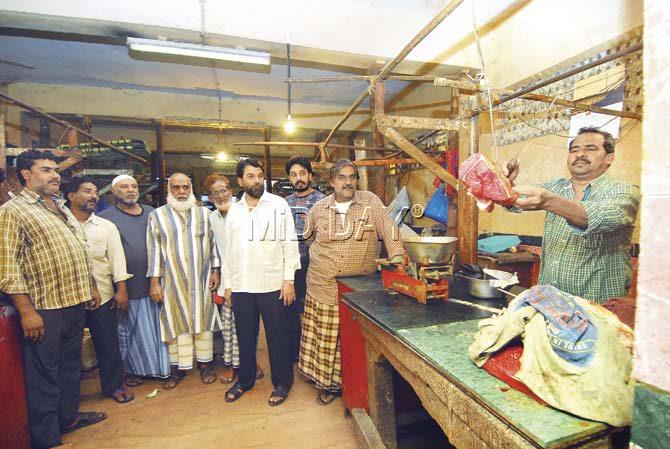The passage of the beef ban in Maharashtra threatens the livelihoods of thousands of butchers, many of whom have been in the business for generations and are solely dependant on it

“The ban on beef will ruin us,” said Sharafat Qureshi (54), a fourth-generation butcher who has been running a beef shop in Bandra town market along with his family since childhood.
ADVERTISEMENT

The Bandra market houses hundreds of such families who are educationally and financially backward, and are completely dependant on the meat business. Pic/Sameer Markande
With the ban on beef receiving the President’s seal, Sharafat isn’t the only one who faces a bleak future. Abattoirs housed in the Bandra town market bore a deserted look yesterday, while the butchers — many of whom have been in business for generations seemed anxious about what the future would hold for them.
On Monday, President Pranab Mukherjee gave his assent to the Maharashtra Animal Prevention (Amendment) Bill, 1995, 20 years after the state assembly passed it. This means that the slaughter of bulls and bullocks is banned across the state.
This puts over 900 legal butcher shops and an equal number of illegal ones across the city out of business. The Bandra market alone holds 30 such shops, run by the Qureshi community, traditionally associated with the meat business, particularly beef.
“We expect the state government to think on the issue and come up with a viable solution. Over 20 families depend on a single butcher shop and, hence, banning them would make thousands of people homeless,” said Intezar Qureshi, vice-president of the Mumbai Suburban Beef Dealer Association.
Legacy of generations
The Bandra market houses hundreds of such families who are educationally and financially backward, and completely dependant on the meat business. Many have been running their shops for generations and have no idea what they will do, now that they have been denied their livelihood.
While the younger generation is somewhat literate, many had still planned on carrying on with their forefathers’ professions. Thirty-year-old Imran Qureshi, for instance, passed the HSC level, but had plans to continue with his family business.
“I have watched my father take care of the business since childhood. Now, suddenly, we will be left with nothing,” he told this paper.
Effect on market
Mohammed Qureshi, president of the association, said, “There are thousands of families in Mumbai itself who are dependent on this occupation. This move by the government will not only destroy their livelihood but will also have an adverse effect on the meat market.”
By adverse effect, Mohammed is referring to meat prices. While the slaughter of cows was already prohibited, the passage of the new Act will also forbid the slaughter of bulls and bullocks. It will, however, permit the slaughter of water buffaloes, which provide carabeef, inferior quality meat that accounts for just 20 per cent of business.
Mohammed said the amended law would increase the rates of water buffalo by 200-300 times. Butchers at the market stressed that not only would this upset the market and current prices, there would also be major loss of customers as well, since the Christian community, which forms a larger share of their clientele, prefer beef over carabeef.
 Subscribe today by clicking the link and stay updated with the latest news!" Click here!
Subscribe today by clicking the link and stay updated with the latest news!" Click here!






